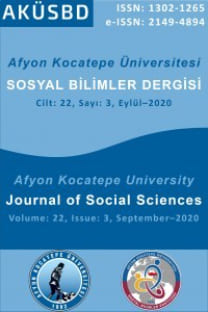Örgüt kültürünün değişiminde insan kaynakları yönetiminin rolüne ilişkin bir araştırma
Günümüz rekabet ortamında örgütleri ayakta tutan kültür kavramı, özellikle Toplam Kalite Yönetim (TKY) anlayışının örgütlerde uygulanması ile birlikte değişim sürecine girmektedir. Örgüt kültürünün değişiminde İnsan kaynakları yönetiminin rolü ve etkisinin belirlenmesine yönelik, üretim ve hizmet sektöründe Toplam kalite anlayışını benimsemiş örgütlerin üst düzey yöneticilerine anket uygulanmıştır. Elde edilen veriler istatistik programında değerlendirilmiş ve söz konusu örgütlerde kültürün değişiminde İKY işlevlerinin (planlama, eğitim, ücretlendirme, performans değerleme) etkin ve belirleyici bir rolü olduğu sonucuna ulaşılmıştır.
A research on the role of human resources management on change in organizational culture
Organizational culture is the entirety of dominant values and beliefs that shape the thoughts and behaviours of members of an organization. In today’s competitive environment, the cultural concepts which keep organizations in existence tends to enter a process of change, especially with the introduction of an understanding and philosophy of Total Quality Management, throughout the organization. Considering that change in organizational culture is dependent upon people, the Human Resources Management (HRM) has a great role to assume and play in establishment and implementation of a culture necessitated by quality management systems.
___
- AKINCI, Beril. (1998), Kurum Kültürü ve Örgütsel İletişim, (Baskısı yok), İstanbul: İletişim Yayınları.
- BAŞARAN, Ethem. (1991), Yönetimde İnsan İlişkileri, Yönetsel Davranış,1.Baskı, Ankara: Kadıoğlu Maatbaa.
- BECKENDORF, Oliver. (1994), “Total Quality Management and World Class Quality”, Ceramic Engineering and Science Proceeding,15/3, May-June, pp.219-222.
- BURTON, Gummer and Philip McCallion.(1995), Total Quality in The Social Services: Theory andPractice, Newyork: Rockefeller Press.
- BOLTON, Trevor. (1997), Human Resources Management, Massachusetts: Black Well Publishers.
- BOONE, Louis and KURTZ, David.(1996). Contemporary Business, New York: The Dryden Press.
- BROOKS, Ian. (1997). “Leadership of a Cultural Change Process”, Health Manpower Management, 23/4, Aug, pp.113-119.
- CAMPBELL, Constance R. (2004), “A Longitudinal Study of One Organization’s Culture: Do Values Endure?”, Mid-American Journal of Business,19/2, Fall,2004, pp.41-51.
- COVEY, Stephen. (1998), “Sürekli Yenilenme”, Executive Excellence Dergisi, Sayı.18,ss.13-14.
- DEAL, Terrence and KENNEDY, Allan. (1982), Corporate Cultures: The Rites and Rituals of Corporate Life, Harmondsworth: PenguiBooks.
- DİNÇER, Ömer. (1998), Stratejik Yönetim ve İşletme Politikası,5. Baskı, İstanbul: Beta Yayınları.
- HAMMER, Michael and CHAMPY, James. (1993), Reengineering the Corporation: A Manifesto for Business Revolution , New York:Harper Business Books.
- KOTTER, John P. (1999), Değişim,(Çev.)Meral Tüzel Koçel, İstanbul: MESS Yayınları.
- LARSON, Paul and SINHA, Asrish.(1995), “The TQM Impact: A Study of Quality Managers Perceptions”, Quality Management Journal,2/3,April, pp.53-66.
- LEWİN, David. (1991), Contemparay Human Resource Management Challenge To Industrial Relations, The Future of Industrial Relations, Ithaca, NY: ILR Press. LUTHANS, Fred and Morey, Nancy. (1985),“Refining the Displacementof Culture and the Use of Scenes and Themes in Organizational Studies”, Academy of Management Review, 10/2,pp.78-99.
- LUTHANS, Fred. (1992), Organizational Behavior, 6th. Edition, Singapore: Mc. Graw-HillInc.
- ÖZKARA, Belkıs. (1999), Evrimci ve Devrimci Örgütsel Değişim, Afyon: Afyon Kocatepe Üniversitesi Yayını.
- REDWOOD, Also. (1990), “Human Resources Management in the 1990s,” Business Horizons, 18/20, January - February, pp.74-76.
- SCHEİN, Edgar H. (1992), Organizational Culture and Leadership, Second edition, San Francisco: Jossey Bass Publication.
- SCHEİN, Edgar H. (1999), The Corporate Culture Survival Guide, SanFrancisco: Jossey Bass.
- SİLVESTER, Joanne and PATTERSON, Fiona. (1999), “Organizational Culture Change: An inter-group attributional analysis.” Journal of Occupational and Organizational Psychology,72/,March, pp.1-23.
- SCHERMERHORN, John R. (1989), Management for Productivity. Third edition, New York:John Wiley and Sons Inc.
- STOREY, John and SİSSON, Keith. (1993), Managing Human Resources and IndustrialRelations, Buckingham: Open University Pres.
- TOPRAK, Meral. (2007), Kurumsal Kültürün Belirlenmesi ve Kobi'lere Yönelik Bir Uygulama, İstanbul Üniversitesi Sosyal Bilimler Enstitüsü, Yayınlanmamış Doktora Tezi, İstanbul.
- UZUNÇARŞILI, Ü.;TOPRAK, M. ve ERSUN, O. (2000), Şirket Kültürü ve İş Prensipleri, İstanbul: İstanbul Ticaret Odası Yayınları.
- VESTAL, K.; W, FRALİCX, RD ve SPRCİER, S.(1997), “Organizational Culture: The critical link between strategy and results.” Hospital and Health Services Administration, 42/3, July, pp.339-365.
- WERTHER, William and. KEİTH, Davis. (1993), Human Resource Management & Personel Management, Fourth Edition, New York:McGraw-Hill.
- WİLKONSON,M.; FOGARTY,M. ve MELVİLLE, (1996), “Organizational Culture Change Throught Traning and Cultural İmmersion”. Journal of Organizational Change Management,19/4, Aug, pp.69-81.
- YURDAGÜL, Halil. “Ölçme Kuramı ve Güvenilirlik Katsayıları.” http://yunus.hacettepe.edu.tr/yurdugul/3/indir/Guvenirlik.pd (12.08.2011).
- ISSN: 1302-1265
- Yayın Aralığı: Yılda 4 Sayı
- Başlangıç: 1999
- Yayıncı: Afyon Kocatepe Üniversitesi Sosyal Bilimler Enstitüsü
Sayıdaki Diğer Makaleler
Özgün UYANIK, Gözde İNAL, Mustafa ERGÜN, Suphi ÖZSÜER
Örgüt kültürünün değişiminde insan kaynakları yönetiminin rolüne ilişkin bir araştırma
Henrı bergson’un zaman kavramına yaklaşımının çağdaş anlatı sinemasına etkisi
Gazzali’de metafizik bilginin imkânı açısından rüya
Yazınsal ürünlerde biçim-içerik tartışmaları: Hakikat ve paradoks arasında sanat
Cemil meriç’in osmanlı ve Cumhuriyet üzerine düşünceleri
Anne ve öğretmen görüşlerine göre çocukların sosyal uyum ve becerilerinin incelenmesi
